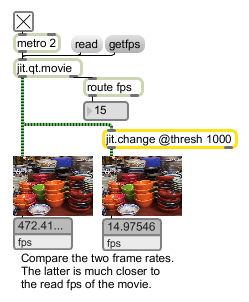Examples

Only pass different frames
| Name | IOProc | Planelink | Typelink | Dimlink | Plane | Dim | Type |
| out | n/a | 1 | 1 | 1 | 1 | 1 | char long float32 float64 |
| Name | Type | g/s | Description |
|---|---|---|---|
| report | int | Report whether a matrix was passed (default = 0) 0 = do not report whether a matrix was passed 1 = report whether a matrix was passed With report set to on (1), jit.change will behave a bit like Max's == object. If jit.change determines that the matrix input has not changed (within the parameters set with the mode and thresh attributes), it will send the message report 1 from its rightmost outlet. If the matrix input has changed, jit.change will send the message report 0 . |
|
| mode | int | Mode of operation (default = 0 (more differing cells)) 0 = pass new frames having MORE differing cells than the number specified by the thresh value 1 = pass new frames having FEWER differing cells than the number specified by the thresh value |
|
| thresh | int | The difference threshold (default = 0) The threshold specifies the number to cells above or below which a new "changed" frame will be output. This object uses cells not planes; if you have a 4-plane matrix and a threshold value of 3, one matrix cell with a different values from the previously passed frame will NOT trigger a new frame -- If you have a single matrix cell with 4 values (one per plane) which are different from the previously passed frame, it will not trigger a new frame. With the mode set to 0, a threshold of 0 means that even 1 different matrix cell between 2 frames will cause that frame to be output. Higher values refer explicitly to the matrix cell count required to cause output (5000 means it will take 5000 different matrix cells to cause the matrix to be output). Setting a negative threshold will pass all frames. |

| Name | Description |
|---|---|
| jit.op | Apply binary or unary operators |